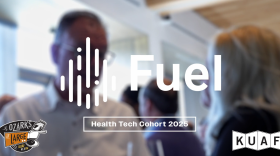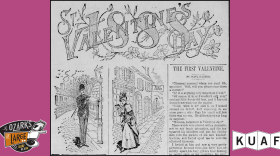Late last year, the Fayetteville City Council adopted Resolution 275-24, in which the city committed to “train leaders to repair harm done to African Americans in Fayetteville.” The resolution follows a 2020 declaration by the city naming racism a public health emergency and pledging to address racial equity.
This latest resolution is sponsored by Lowell Taylor, a local activist and co-founder of the Zacchaeus Foundation. The nonprofit is raising money to fund reparations efforts, with a particular focus on involving the Christian church.
“Last week, we were at Saint Paul’s, and this week we’re here at the library, having a conversation about racial equity and reparations,” Taylor said during one recent community training.
This summer, as part of the city’s commitment, the Zacchaeus Foundation led a series of racial equity workshops at local churches and the Fayetteville Public Library. The events were held in collaboration with First Repair, a nonprofit based in Evanston, Illinois, and founded by Robin Rue Simmons.
Simmons, who was an Evanston alderwoman when that city approved the country’s first government-funded reparations program, said these trainings are meant to help communities begin envisioning their own paths toward reparative justice.
“As proud as I am of Evanston and certain of our divine assignment, what I have recognized now being all across the United States is the partners and the leaders and the experts are in every city,” Simmons said. “So what we do when we go and provide partnership is we tell the Evanston story and connect it to Fayetteville or wherever we’re at.”
Evanston’s reparations program offers one-time payments of $25,000 to Black residents who lived in the city between 1919 and 1969, or their descendants. The program is funded through a mix of cannabis tax revenue and real estate transfer taxes. Since its launch in 2021, the initiative has distributed $5.5 million to more than 200 residents.
Though Fayetteville is still in the early stages of its own efforts, Taylor said the Evanston example is a valuable tool.
“We’re really thinking of these events with Robin as a way to inspire people in Fayetteville by describing what’s been done in Evanston,” he said.
Originally introduced in October 2024, Fayetteville’s resolution was significantly amended before adoption. The original language would have directed city funding toward racial equity training for council members and employees and laid groundwork for a formal reparations program. The final version made participation voluntary and removed funding mechanisms.
Simmons and First Repair agreed to waive their training fees. While Taylor acknowledges the limitations of the resolution, he said the symbolic value is important.
“In the training that we’re hosting this month, one of our friends, the Reverend Dr. Michael Nabors, quotes Frederick Douglass, who said, ‘Where there is no struggle, there is no progress,’” Taylor said. “Now is the time to resist some regressive forces in our community and our country that would want to take us back to a less equitable and just time.”
Adding to the challenge is a new Arkansas law passed during the state’s most recent legislative session. Senate Bill 520 prohibits local governments from enacting diversity, equity, and inclusion offices, officers, or policies.
D’Andre Jones, a Fayetteville City Council member representing Ward 1, co-sponsored the racial equity resolution. He said the current program does not violate the law, since it involves no public funding and participation is optional.
“We have to think outside the box,” Jones said. “You have your faith-based organizations and the nonprofits. There are so many other avenues we can explore to bring this idea full circle without compromising any state laws. When one door closes, usually five or six others open.”
Jones said at least five of the city’s nine council members have participated in the trainings.
“For the past several years, the city of Fayetteville has been on the front lines when it comes to racial justice,” he said. “We were the first city in the state to proclaim Juneteenth as an official holiday, the first to hang a Black Lives Matter banner, and the first to launch Black History Month city-sanctioned programming. But this feels different—this is reparations. And to many people, that’s taboo. But I think that’s often because they don’t fully understand.”
Education remains one of the biggest barriers to widespread support. A recent Pew Research Center poll found that just 30 percent of white Americans support reparations for Black Americans, while 70 percent are opposed.
Elizabeth Scott of Elkins attended one of the training sessions. She said it helped her understand how reparations can work in practice.
“Having this information has given me a tool to connect people with more information so they can learn on their own,” Scott said. “It’s difficult to change someone’s mind, but I had a mind change here just learning more myself.”
Taylor said these conversations are just the beginning. The next step in the racial equity training process will take place on Saturday, Sept. 6, when Simmons is scheduled to return to Fayetteville.
“She’ll be with us in person,” Taylor said. “And that’ll be an opportunity to do something a little different—namely, train people to prescribe what can be done in Fayetteville with Evanston as an example.”
Ozarks at Large transcripts are created on a rush deadline. Copy editors utilize AI tools to review work. KUAF does not publish content created by AI. Please reach out to kuafinfo@uark.edu to report an issue.








